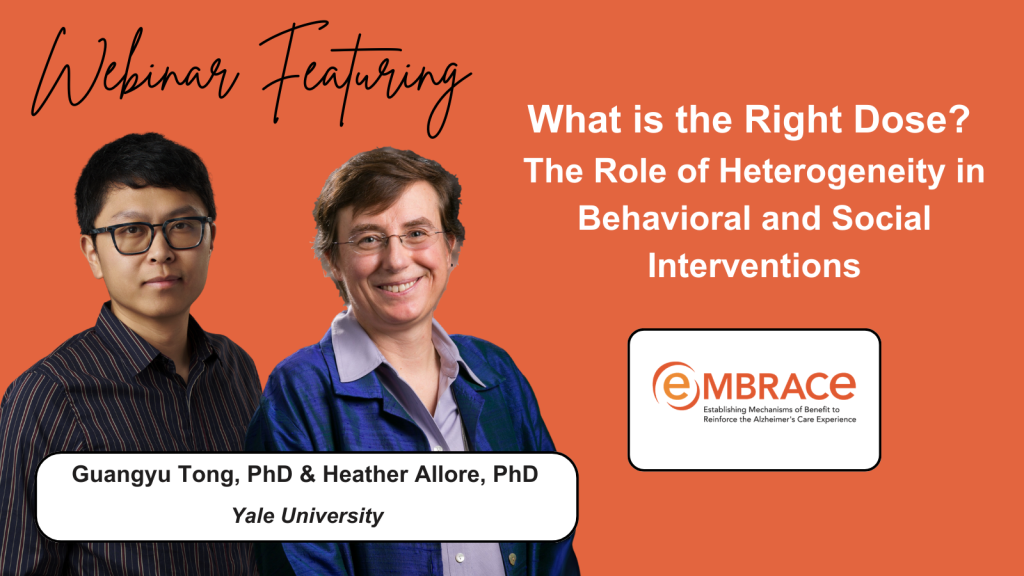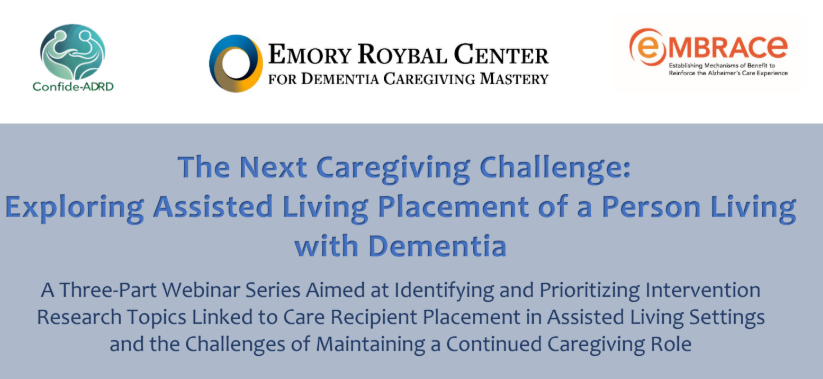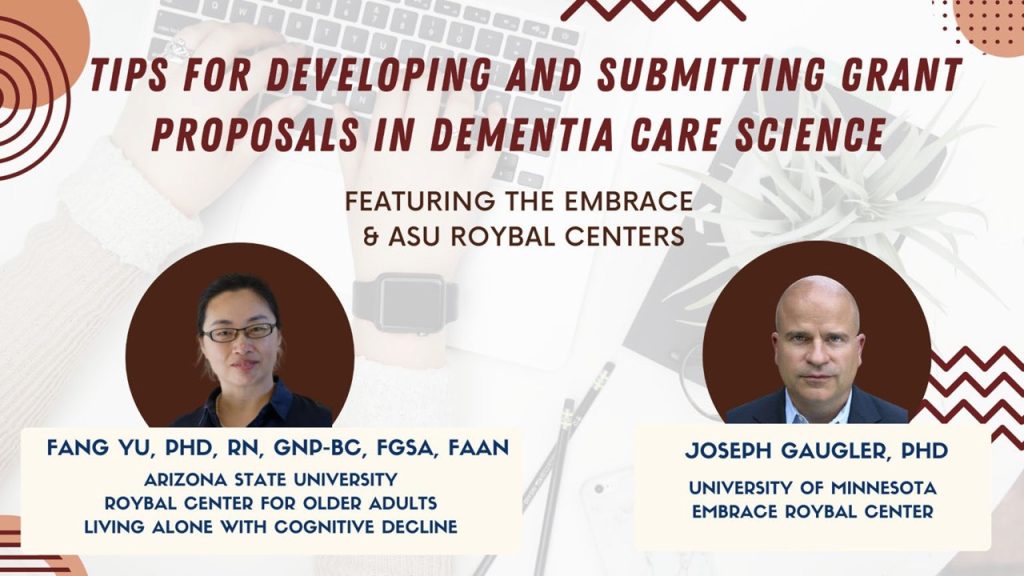Explore our upcoming EMBRACE webinars, register to attend, and watch recordings after each session. Want to stay in the loop? Join our mailing list here ![]() to receive the latest updates. If you have any questions or suggestions for future webinar topics, please contact us at EMBRACE@umn.edu.
to receive the latest updates. If you have any questions or suggestions for future webinar topics, please contact us at EMBRACE@umn.edu.
Upcoming Events
Our next webinar, an EMBRACE Executive Committee panel discussion on mechanistic research in dementia care, is being planned for May 20, 2026.
Check back soon for more event details and registration information, or join our mailing list ![]() for event updates.
for event updates.
Recorded Webinars

Jeffrey Birk, PhD, MS, is an Assistant Professor of Medical Science at Columbia University Irving Medical Center. He is an affective psychologist with a background in psychophysiology and emotion regulation. Dr. Birk’s research examines psychological factors and health behaviors in cardiovascular patient populations, including cardiac arrest and acute coronary syndrome. He has developed mechanism-focused interventions to reduce psychological distress in cardiac patients after acute medical events.
This presentation introduces a resource designed to guide researchers how to conduct rigorous mechanism-focused research in a step-by-step manner across multiple study designs. This tool was developed as part of the Science Of Behavior Change initiative. The webinar describes the rationale for mechanism-focused research and the importance of properly measuring the mechanisms that are believed to underlie the potential efficacy of interventions. It details how CLIMBR can inform the development, implementation, reporting, and evaluation of mechanism-focused research across a broad range of study designs.
Download webinar slides: Birk-EMBRACE-Webinar-2025.pdf ![]()

David L. Roth, PhD, MA, is a Professor Emeritus of Geriatric Medicine and Biostatistics at Johns Hopkins University. He was trained as a clinical psychologist and has considerable expertise as an applied statistician, with over 40 years of experience as an NIH-funded investigator. In addition to his collaborative contributions, Dr. Roth served as a Principal Investigator on multiple R01 grants that examined the health effects (and benefits) of family caregiving using data from large national epidemiological investigations. Although Dr. Roth retired from his full-time academic position in 2024, he continues to be an active scholar and serves as a consultant on multiple funded projects, including the EMBRACE Roybal Center. He has a long history of collaboration with EMBRACE Center leaders.
This presentation introduces investigators to key decisions that must be made when testing intervention mechanistic hypotheses with statistical mediation methods. Topics include whether change scores or post-treatment scores should be analyzed, how baseline (pre-treatment) measures should be used as covariates, the importance of selecting mediating variables with very high reliabilities, and the availability of multiple methods for testing the statistical significance of and interpreting the magnitude of the mediated effect.
Download webinar slides: Roth-EMBRACE-Webinar-2025.pdf ![]()

Heather Allore, PhD, has been at Yale since 2000. Her research is focused on issues related to the design and analysis of trials and studies of multifactorial geriatric health conditions, especially among persons with Alzheimer’s Disease and related dementia. Several projects focus upon health disparities of older adults. She developed a sub-discipline of biostatistics that focuses on training and methodological development in geriatrics called “Gerontologic Biostatistics.” This discipline trains biostatisticians for conducting collaborative research with clinical investigators in geriatrics and gerontology and provides the basis for the development of new statistical methodologies. She has developed a website that aids those interested in aging research, including those familiar with analytic methods and those getting familiar with these methods.
Guangyu Tong, PhD, is an Assistant Professor of Cardiovascular Medicine at the Yale School of Medicine and Biostatistics at the Yale School of Public Health. He directs the Cardiovascular Medicine Analytics Center (CMAC), which supports study design and analytics across Yale’s cardiovascular research community. His research spans cardiovascular medicine, pragmatic trial methodology, implementation science methods, Bayesian statistics, and causal inference, with contributions to NIH-funded trials and global health studies. Dr. Tong holds faculty affiliations with interdisciplinary initiatives in implementation science, Alzheimer’s disease, HIV prevention, and firearm injury prevention. He also serves as Statistical Editor of the Journal of the American College of Cardiology (JACC).
This presentation describes the concept of a dose in behavioral and social interventions. We cover challenges in determining optimal dose in behavioral and social interventions with single and multicomponent interventions and in the context of heterogeneity. We provide an overview of approaches for testing doses and components including descriptive, inferential, and adaptive designs. Lastly, we present a real-world dementia intervention and implications for research.
Download webinar slides: Allore-Tong-EMBRACE-Webinar-2025 ![]()

The Next Caregiving Challenge: Assisted Living Placement of a Person Living with Dementia Session 1 ![]()
The Next Caregiving Challenge: Assisted Living Placement of a Person Living with Dementia Session 2 ![]()
The Next Caregiving Challenge: Assisted Living Placement of a Person Living with Dementia Session 3 ![]()

Dr. Fang Yu, PhD, RN, GNP-BC, FGSA, FAAN, is Professor, Edson Chair in Dementia Translational Nursing Science, and Director of ASU Roybal Center for Older Adults Living Alone with Cognitive Decline at Arizona State University Edson College of Nursing and Health Innovation. Dr. Yu’s research focuses on developing exercise and cognitive interventions to prevent and treat Alzheimer’s disease. Her research findings have led to many peer-reviewed papers, a book titled Alzheimer’s Rx: Aerobic Exercise (Use the Approach AD S.A.F.E.ly™ Protocol to Engage Purposefully), and the FIT-AD™ Certificate Program to increase exercise access for people with AD.
Dr. Joseph E. Gaugler, Ph.D., is the Robert L. Kane Endowed Chair in Long-Term Care & Aging in the Division of Health Policy and Management in the School of Public Health at the University of Minnesota. He is also director of the Center on Aging and the Director of the Establishing Mechanisms of Benefit to Enhance the Alzheimer’s Research Care Experience (EMBRACE) AD/ADRD Roybal Center (with Dr. Andrea Gilmore-Bykovskyi). Gaugler’s research examines the sources and effectiveness of long-term care for persons with Alzheimer’s disease and other chronic conditions.
This collaborative presentation serves as an introduction to the EMBRACE Roybal Center and the ASU Roybal Center. The ASU Roybal Center supports clinical trials of MoBC-driven, technology-enabled interventions that delay ADRD and improve quality of life in older adults living alone with cognitive decline. The EMBRACE Roybal Center offers robust support to advance research capacity for mechanistic-based home and community-based dementia care intervention trials.
The presentation focuses on providing tips for developing and submitting grant proposals for dementia care science. Dr. Gaugler and Dr. Yu share grant application best practices, particularly for proposals focused on mechanistic research.
Download webinar slides: Gaugler-Yu-EMBRACE-Webinar-2026 ![]()
